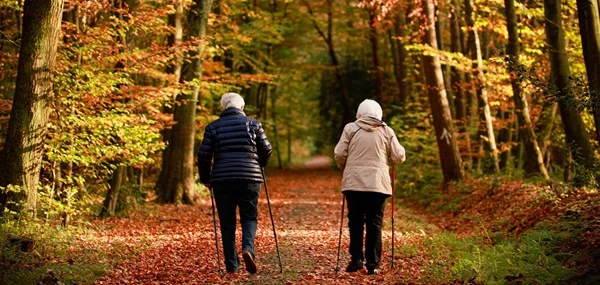Better mental and physical health among the elderly is associated with nature proximity
Chemistry researchers modify solar technology to produce less harmful greenhouse gases / Having more positive emotions as a teen could lead to better health and well-being as an adult
A mere 10% increase in forest area within an individual's residential ZIP code was linked to a decrease in severe psychological distress, defined as treatment-required mental health issues that disrupt social activities, employment, or academic pursuits. In a similar vein, expanding the length of trails, green space, tree cover, or water bodies by 10% decreased the likelihood that senior citizens would rate their general health as poor or middling.
"Our findings suggest that loss of our urban green and blue spaces due to rapid urbanization may not just have an environmental impact but could have a public health impact as well," said first study author Adithya Vegaraju, a medical student in the WSU Elson S. Floyd College of Medicine.
Published in the journal Health & Place, the study is based on health survey data from more than 42,000 people aged 65 and older who lived in urban areas of Washington state between 2011 and 2019. The researchers established a correlation between the mental and overall health of survey participants and various indicators of green and blue space accessibility, including forests, parks, lakes, and rivers, in the vicinity of their residences (ZIP codes). Nearly 2% of the participants exhibited indications of severe psychological distress, while 19% stated that their overall health was average or subpar.

While previous research has explored the potential health effects of proximity to nature, this study is among the first to examine this correlation specifically among older individuals in the United States, according to Vegaraju. Mental health issues such as depression, which has been shown to increase the risk of cognitive decline and dementia, are particularly prevalent among the elderly. Furthermore, their likelihood of receiving treatment to manage their mental health conditions is diminished.
"Older adults with depression, anxiety or mental health issues are known to be more resistant to medical interventions or talk therapy, which are the go-to treatments for these conditions," said Vegaraju. "If exposure to green or blue spaces could help prevent, delay or even treat poor mental health in older adults, we need to look at that more closely as a way to improve mental health outcomes in this population."
Nature prescriptions, a growing trend in which healthcare providers provide patients with written recommendations to spend time outdoors, could be one potential solution, according to him.
Solmaz Amiri, senior author of the study, stated that additional research is required to determine precisely how exposure to green and azure spaces may improve mental and overall health. Her objective is to investigate the potential correlation between exposure to nature and cognitive deterioration, a precursory indication of Alzheimer's disease or dementia.
"It is thought that exposure to green and blue spaces could help slow cognitive decline," said Amiri, a research assistant professor in the WSU College of Medicine and a researcher in the Institute for Research and Education to Advance Community Health (IREACH). "What we would like to know is if green and blue space exposure can influence dementia directly or whether it can do so by reducing mental health issues that may lead to cognitive decline."
She hopes that this research will ultimately assist in resolving health disparities among older adults from disadvantaged socioeconomic backgrounds, which may be attributable to unequal access to verdant and blue spaces in their urban environments.
Journal Reference: Adithya Vegaraju, Solmaz Amiri. Urban green and blue spaces and general and mental health among older adults in Washington state: Analysis of BRFSS data between 2011-2019. Health & Place, 2024; 85: 103148 DOI: 10.1016/j.healthplace.2023.103148
End of content
Không có tin nào tiếp theo
